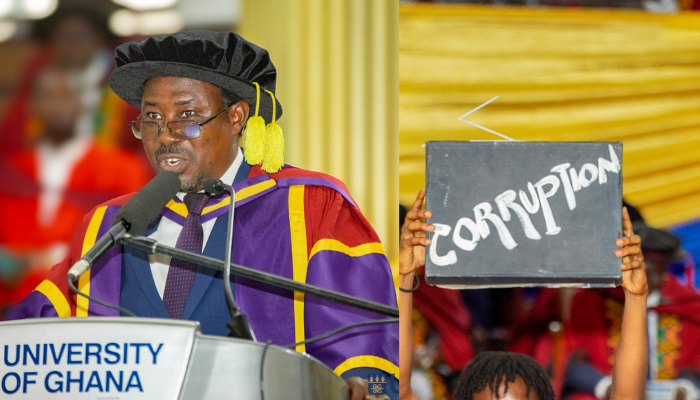UGBS Dean Links Ghana’s Corruption to Generational Ethical Failure; Urges Moral Reawakening to Address Development Woes

Professor of Public Administration and Management at the University of Ghana, Justice Nyigmah Bawole, has identified what he describes as a generational pattern of corruption caused by a deep ethical breakdown, saying the situation requires urgent national reawakening.
Professor Bawole, who is Dean of the University of Ghana Business School, while delivering his inaugural lecture titled “Our Corruption, Our Ethics, Our Public Administration: Wicked Citizens, Wicked Problems and Stagnating Development” at the Great Hall, argued that Ghana’s stagnating development is a result of poor policies, weak institutions and a collective moral failure that must be addressed through civic re-education, ethical leadership and public celebration of integrity.
The event drew a distinguished audience that included the senior academics, government officials, national leadership of the Church of Pentecost, members of the clergy, traditional leaders and civil society representatives as well as students.

Prof. Bawole, in making his points, described the country’s development struggles as a reflection of a widespread ethical collapse that has taken root across generations, warning that citizens are not just victims of corruption, but active participants and collaborators in a moral culture that sustains it. “Corruption in Ghana is not the work of a few rogue individuals. It is a system-wide ethical collapse. It is attitudinal, generational, and systemic. It is our corruption,” he stated.
To support his point, Prof. Bawole cited everyday examples such as bribing for school placement, inflating public contracts and neglecting public cemeteries. “Even the dead are not spared our institutional decay,” he said. “Perhaps it is time we hired security to protect the dead from the living so they can truly rest in peace.”
He used the framing of “wicked citizens” and “wicked problems” to describe the moral contradictions and complex challenges facing the country. “Our conduct in public and private life often betrays the values we claim to hold,” he said. “Policy solutions alone cannot fix what is fundamentally a cultural and ethical problem.”

Drawing on research findings and historical comparisons, Prof. Bawole noted that Ghana has failed to match the progress of countries such as Singapore, South Korea and Malaysia, despite sharing similar development conditions in the 1960s.
He attributed the divergence to economic management and the weakening of civic responsibility and public ethics. “Institutions without integrity, policies without legitimacy and reforms without public trust do not create change. They create the illusion of change,” he said.
He expressed concern over the influence of unethical leadership, warning that, “If today’s youth are tomorrow’s judges, bureaucrats and parliamentarians, then our corruption is not just persistent, it is an inheritance.” “It is passed down not through genes, but through our silences, our compromises and our excuses.”
Prof. Bawole called for a national ethical transformation beginning with civic re-education from the basic level to the university, using case-based methods and traditional Ghanaian proverbs to reinforce values. He also urged the media, faith-based institutions and civil society to publicly highlight stories of honest individuals and make role models of ethical behaviour. “Our youth cannot emulate examples they do not see or hear,” he added.

Proposing a series of institutional reforms, he recommended integrity audits as a requirement for public sector promotions, mandatory ethics training for all public officials, digitised public processes and stronger legal protection for whistleblowers. “Speaking truth to power must be honoured, not punished,” he indicated.
The Professor shared his personal commitment to ethical leadership, noting that during his tenure as Dean, he adopted a strict no-gift policy and redirected potential benefits to student support funds. “If I had joined the 10% game on our new lecture hall complex, I would be 20 million cedis richer. I chose the high road and so can we all.”
Prof. Bawole, who has served for six years as Dean of the University of Ghana Business School, holds a PhD in Development Policy and Management from the University of Manchester, with Diploma, undergraduate and MPhil degrees from the University of Ghana. He has published extensively on public ethics, governance and administrative reform, and has served in various academic leadership roles, including Head of Department for Public Administration and Health Services Management.
He ended the lecture with a powerful call for collective accountability, urging all citizens to take personal responsibility for ethical conduct. “We cannot outsource ethics. Each of us must choose the high road, not because it is easy, but because our future depends on it,” he said.
Prof. Bawole strongly appealed for a return to the core values that once defined Ghana’s traditional public life. He emphasised that no governance reform will succeed without a renewed moral foundation. “Until we confront our shared moral failures,” he concluded, “no amount of policy reform will deliver meaningful progress.”
Before the lecture, Vice-Chancellor Prof. Nana Aba Appiah Amfo, who chaired the event, described it as a call for citizens, policymakers, scholars and public servants to look into the mirror of “our corruption” and choose a different path, one grounded in justice, integrity and collective responsibility.

She took the opportunity to commend Prof. Bawole for his scholarship, grantsmanship and transformational leadership, particularly as Dean of one of the best business schools on the continent.
The Registrar, Mrs. Emelia Agyei-Mensah, explained that the event was organised in line with the University’s tradition of honouring and celebrating faculty members whose dedication to teaching, research and service has earned them promotion to the rank of professorship. She noted that the initiative also aligns with the University’s strategic priority on commitment to faculty and staff, ensuring their contributions are recognised through appropriate platforms.
As part of the inaugural lecture activities, the University of Ghana Library System also organised a weeklong exhibition showcasing his scholarly works.